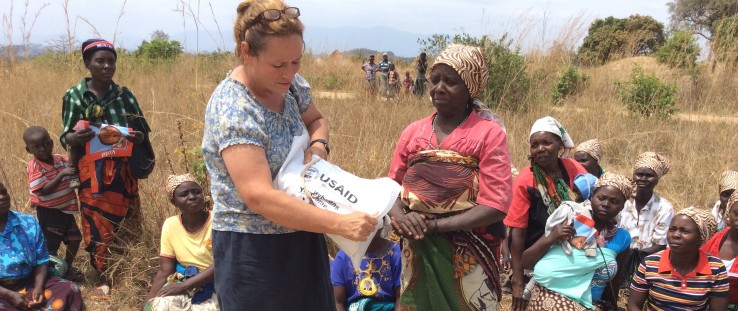 University of Missouri Innovation Lab researcher Kerry Clark provides extension training to soybean success kit recipients in northern Ghana.
Kerry Clark
University of Missouri Innovation Lab researcher Kerry Clark provides extension training to soybean success kit recipients in northern Ghana.
Kerry Clark
 University of Missouri Innovation Lab researcher Kerry Clark provides extension training to soybean success kit recipients in northern Ghana.
Kerry Clark
University of Missouri Innovation Lab researcher Kerry Clark provides extension training to soybean success kit recipients in northern Ghana.
Kerry Clark
Speeches Shim
Researchers at the Feed the Future Innovation Lab for Soybean Value Chain Research led by the University of Illinois are seeing how soybean is taking root in sub-Saharan African countries like Mozambique and Ghana. And the success of their aptly named soybean success kits over the last several years is resulting in high yields and better incomes. All of this, from a commercial crop that is a relative newcomer to these regions.
The kits are designed to be an all-in-one crop improvement tool, with each containing 2.5 kilos of high-quality soybean seed, 2 kilos of fertilizer, a small sachet of inoculant and pictorial instructions that explain planting and harvesting printed on each bag. The innovative soybean success kits bundle inputs for soybean production that can be difficult to access because of supply, distance to markets, or access to input dealers and sales agents in smallholder farmer communities.
The inputs contained in the kits improve soybean yields by focusing on soil health, high-quality seed and appropriate agronomic practices. Farmers using the kits saw soybean yields more than double from 1,000 kilograms per hectare to 2,300 kilograms per hectare. This shows that, with the correct inputs and training on appropriate agronomic practices, smallholder farmers can drastically increase their crop yields and, in turn, their incomes.
University of Missouri Innovation Lab researcher Kerry Clark collaborated with Catholic Relief Services, Ghana’s Savanna Agricultural Research Institute (SARI), the Ghanaian Ministry of Agriculture, and the Mozambican Institute of Agricultural Research (IIAM) to distribute 4,800 kits in Mozambique and Ghana in 2015 and 2016. In addition to distribution, the Soybean Innovation Lab also provided training to ministry extension service personnel on how to arrange and distribute the kits and the appropriate extension guidance on how they should be used.
The kits were distributed as part of a study conducted by the Soybean Innovation Lab to understand the relationship between soybean production and gender equity, input and seed access, farmer networks, and land use changes. Results from the study will guide development practitioners, NGOs, government ministries and other agricultural organizations as they seek to bring soybean farming to smallholder communities.
“The important thing about the soybean success kit is that it packages all of the needed inputs together and ensures that the producers will get the best outcome from their months of sowing, weeding and harvesting,” says Clark. “It is also vital that the kit comes with extension communication so that fertilizer and inoculant are properly used and best able to bring about positive impact in yield increases.”
“If inputs aren’t seen as necessary for good crop production practices, yields will remain low and smallholder farmers will continue to struggle to feed themselves,” Clark continued. “Packaging inputs together shows the importance of each component in a growing system—good seed, fertilizer, inoculant for legumes, and knowledge on how to best grow and store the crop are all equally vital to improved yields.”
Soybeans represent a considerable opportunity for financial, nutritional and agronomic security in sub-Saharan Africa for smallholder farmers who have increasingly adopted the crop to supplement their income and provide a safety net for themselves and their communities.
Nicolas Denwar, a senior research scientist with SARI, believes that the kits offer farmers an opportunity to improve their yields in a way they would not otherwise have been able to access.
“Soybean, as with any legume, requires some form of phosphorus fertilizer. So the success kit concept is a novelty that is helping; it is bringing these seeds to farmers that would not otherwise have access to them. They’re mostly in rural areas, and the seed companies don’t have sales outlets there. Aside from getting them the seed, the kits are also educating the farmers on the importance of fertilizer and inoculum for improving their yields,” he said.
Clark hopes that the increased knowledge and yields provided by the success kits will help drive consumer demand for the inoculants and fertilizers. “Low levels of knowledge about inputs amongst smallholder farmers leads to low yields because they don’t have the information they need to make sure that, when they buy seeds, that they also get inoculant and fertilizer that does not contain nitrogen,” she says. “Agricultural dealers may not supply these necessary inputs because there is currently little demand, but demand is based on the customer actually knowing that the product exists. Using success kits helps sensitize smallholders to all of the components of a successful production system.”
Before using the kit, Yahaya Gonga, a farmer near Chereponi, Ghana, said his yields were low due to bad weather, poor soil fertility and lack of access to good quality seeds. He barely grew enough to feed his family.
“This was the first year that I’ve used the inoculant when planting,” says Gonga, whose yield has now improved considerably. “The germination is very good. When I didn’t have inoculant, some germinated and some didn’t.” Improved seed germination is a result of the high-quality, viable soybean seed that is contained in the kits.
Mariama Imoro, another smallholder farmer in the Chereponi region, also saw noticeable improvement in her yields. “The success kit and the training on how to grow soybeans has had great impact on the growth of the plants compared to previously. So I am confident that if you dedicate yourself to growing the soybean, you will make a lot of money from it.”
Soybean Innovation Lab researchers talked with other community members about their experiences with the kits and asked for feedback on how the lab could help improve soybean adoption in the countries. It intends to continue working within these communities with annual follow-up surveys to better understand and improve future soybean development programs, focusing on gender equity and the provision of necessary, high-quality inputs.
As awareness among farmers builds through the use of appropriate agronomic inputs, the private sector can play a critical role in fulfilling the growing demand.
Rose Keane is a communications specialist, Courtney Tamimie is associate director, and Peter Goldsmith is principal investigator with the Soybean Innovation Lab.


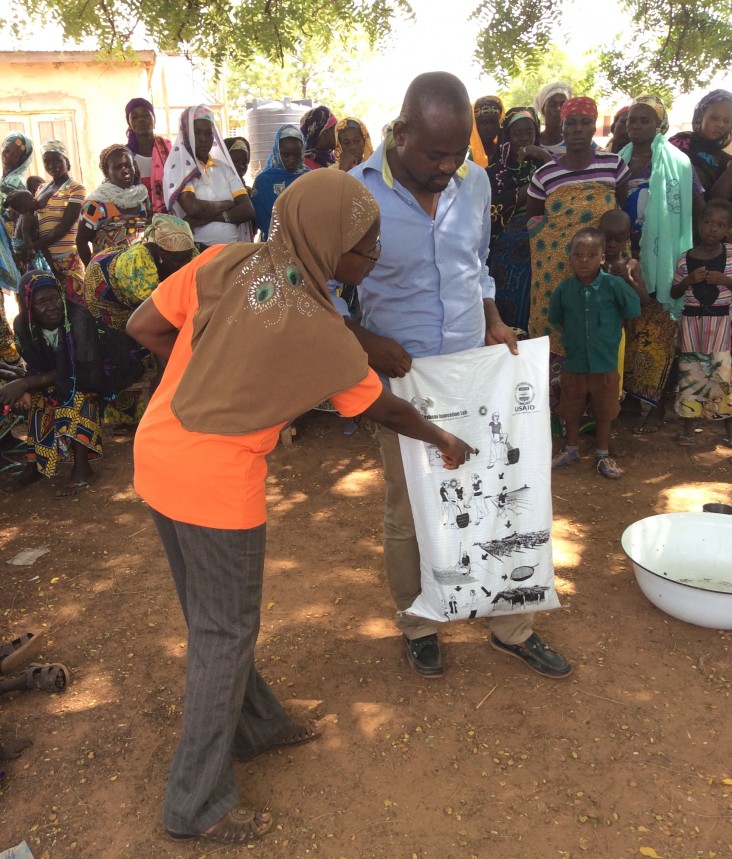
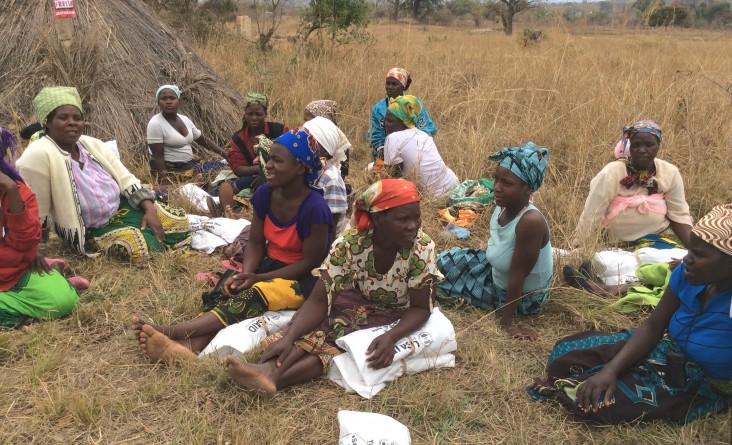
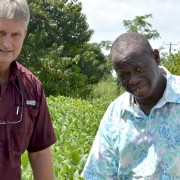
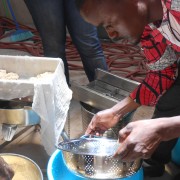
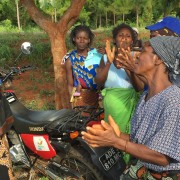
Comment
Make a general inquiry or suggest an improvement.